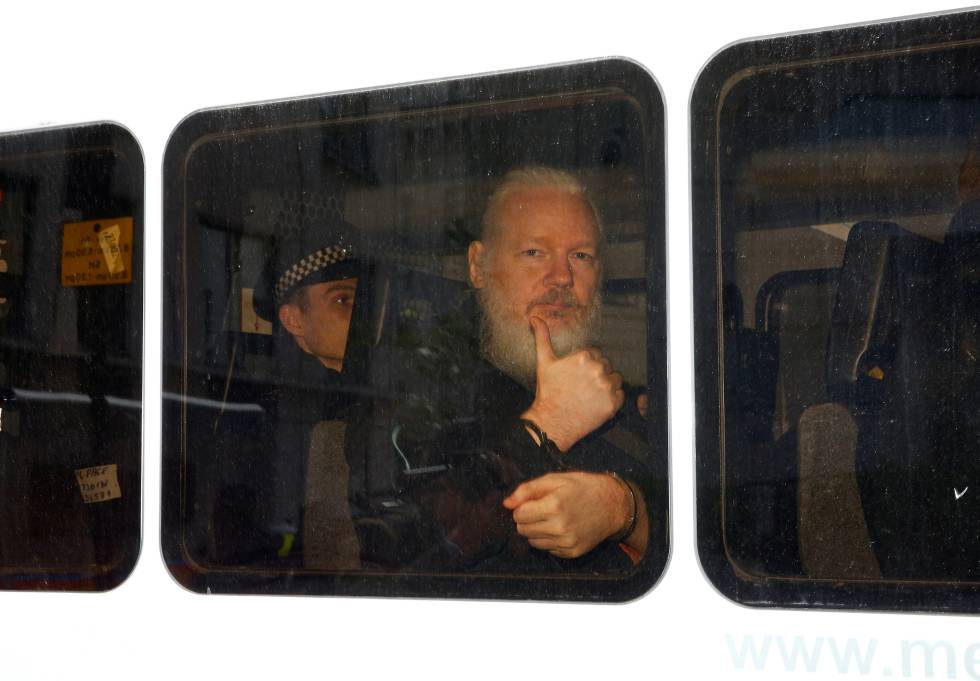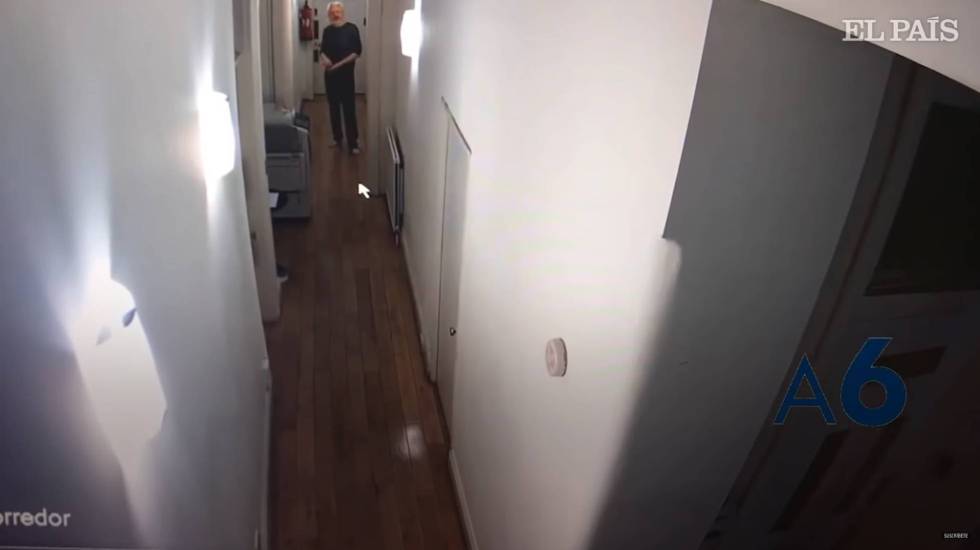Ecuador will give Julian Assange’s embassy computers and files to the US
Judicial authorities greenlight search of a room used by the WikiLeaks founder during his seven-year stay in the diplomatic headquarters in London
1
Conéctate
José María Irujo
Madrid 13 MAY 2019 - 11:04 CEST

Julian Assange inside a police van after his arrest on April 11. Reuters
The government of Ecuador has taken one more step in its offensive against cyberactivist Julian Assange. The Ecuadorian attorney general has greenlighted an operation to search one of the rooms that the WikiLeaks founder used during his prolonged stay at the Ecuadorian embassy in London, and agreed to turn over to US authorities any documents, cellphones, digital files, computers, memory drives, CDs and any other devices that may turn up during the search, according to an official notice that EL PAÍS has seen.
The US government wants Assange to be extradited from the United Kingdom so he can be tried for the release of classified military material in 2010. He is being charged with conspiracy to commit computer intrusion in the US, and faces up to five years in prison if found guilty of leaking 450,000 internal documents about the Iraq and Afghanistan wars to the media.
The systematic violation of Assange’s rights is going beyond the limits of what’s conceivable
Baltasar Garzón, Assange’s lawyer
The search of Assange’s sealed-off room will take place on May 20 as part of a petition for judicial assistance issued by the US Department of Justice to the government of Ecuador. The request says the search will take place at 9am London time, under the oversight of police chief Diego López and second sergeant Milton Jaque, a computer forensic expert. The decision to confiscate Assange’s belongings has been communicated to his lawyer in Ecuador, Carlos Poveda.
The 47-year-old activist was arrested on April 11 at the embassy in London and turned over to British authorities after Ecuador withdrew its asylum. Assange was granted political asylum in June 2012, by the leftist government of Rafael Correa after all his legal efforts to fight extradition to Sweden had failed. He was wanted in that country on two sexual assault charges.
But Correa’s successor, Lenín Moreno, considered Assange “an inherited problem” and “a stone in the shoe.” The new administration in Ecuador improved its relations with the US, and Moreno introduced tougher visiting rules and living conditions for Assange at the diplomatic mission in London. On April 11 Ecuador revoked its protection, allowing British authorities to arrest the activist, and now the Moreno administration is agreeing to turn over his personal computing devices and files to the US government.

Julian Assange inside the Ecuadorean embassy.
Baltasar Garzón, a former crusading judge from Spain who is now Assange’s lawyer, has described this latest decision as “an absolute violation of the institution of asylum by Ecuador.”
“It is incomprehensible that the country that afforded him protection is now taking advantage of its privileged position to turn over his belongings to the country that is persecuting him. These belongings will be seized without a court warrant, without protecting the rights of political refugees, without respecting the chain of custody,” added Garzón. “And this is made worse by the system of illicit recordings that went on at the embassy, and over which a complaint has already been filed. The systematic violation of Assange’s rights is going beyond conceivable limits.”
The judicial cooperation between the current government of Ecuador and the US began months ago. The Ecuadorian justice system allowed US authorities to take statements from diplomatic personnel at the London embassy, and Assange’s lawyers are not ruling out the possibility that recordings, audio files and documents taken from the activist and one of his lawyers during an alleged spy operation may have ended up in the hands of the United States government.
This is confidential material that will allow the US to come up with new charges to request his extradition
Aitor Martínez, lawyer
Meanwhile, Assange has also filed a complaint with Spain’s High Court, the Audiencia Nacional, against a Spanish journalist and four computer programmers who attempted to sell him hundreds of videos and documents depicting private moments of his last few years at the embassy. This group was asking for €3 million in exchange for not releasing this material to the media. The United Nations special rapporteur on privacy is also analyzing this alleged case of spying.
Aitor Martínez, one of the lawyers in the legal team defending the Australian activist, says that Ecuador’s recent initiatives are “a manifest and radical violation of the right to a defense, since those documents and devices contain all of [Assange’s] communications with his lawyers and his legal documents. This is confidential material that will allow the US to come up with new charges to request his extradition.”
The WikiLeaks founder has formally told a London court that he does not wish to surrender to extradition to the US. Days before that, another British court sentenced him to 50 weeks in prison for jumping bail in 2012, at the time when he was facing extradition to Sweden on rape and sexual assault charges.
@88m3 @ADevilYouKhow @wire28 @dtownreppin214
@DonKnock @dza @wire28 @BigMoneyGrip @Dameon Farrow @re'up @Blackfyre @Cali_livin @NY's #1 Draft Pick











